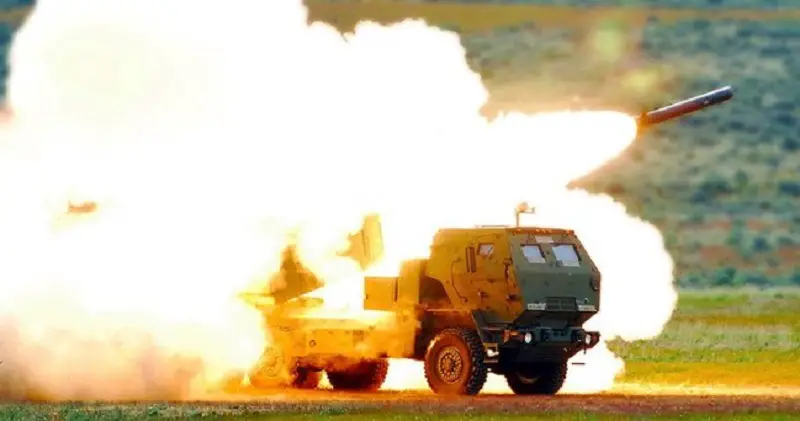The U.S. State Department has made a determination approving a possible Foreign Military Sale to the Government of Estonia of M142 High Mobility Artillery Rocket System (HIMARS) and related equipment for an estimated cost of up to $500 million. The Government of Estonia has requested to purchase up to six (6) M142 High Mobility Artillery Rocket System (HIMARS) Launchers; up to thirty-six (36) M30A2 Guided Multiple Launch Rocket System (GMLRS) Alternative Warhead (AW) Missile Pods with Insensitive Munitions Propulsion System (IMPS) and Frequency Modulated Continuous Wave – Directional Doppler Ranging (FMCW-DDR) Proximity Height-of-Burst (HOB) Sensor Capability; up to thirty-six (36) M31A2 GMLRS Unitary High Explosive (HE) Missile Pods with IMPS and FMCW-DDR Proximity HOB Sensor Capability; up to thirty-six (36) XM403 Extended Range GMLRS (ER GMLRS) Alternative Warhead (AW) Missile Pods with IMPS and Side Mounted Proximity Sensor (SMPS) HOB Capability; up to thirty-six (36) XM404 Extended Range GMLRS (ER GMLRS) Unitary Pods with IMPS and SMPS HOB Capability; and up to eighteen (18) M57 Army Tactical Missile System (ATACMS) Missile Pods.
The M142 High Mobility Artillery Rocket System (HIMARS) is a light multiple rocket launcher developed in the late 1990s for the United States Army and mounted on a standard U.S. Army M1140 truck frame. The launcher can be transported by Lockheed C-130 Hercules aircraft. The chassis was initially produced by BAE Systems Mobility & Protection Systems (formerly Armor Holdings Aerospace and Defense Group Tactical Vehicle Systems Division), the original equipment manufacturer of the FMTV. It was produced by the Oshkosh Corporation from 2010 to 2017. Both chassis and launcher system are now produced by Lockheed Martin Missiles & Fire Control in Camden, Arkansas. A total procurement of 900 launchers is planned. HIMARS entered service with the US Army and Marine Corps in 2005. It has been exported to Jordan (12), Singapore (18) and the United Arab Emirates (20). Some other export customers are considering this system. In 2022 a small number of HIMARS systems were delivered to Ukraine in order to defend against the Russian invasion.

The M142 HIMARS carries one pod with either six GMLRS rockets, or two PrSM missiles, or one ATACMS missile on the U.S. Army’s new Family of Medium Tactical Vehicles (FMTV) five-ton truck and can launch the entire Multiple Launch Rocket System Family of Munitions (MFOM). M142 ammunition pods are interchangeable with the M270 MLRS; however, it is able to carry only one pod rather than the standard two for the M270 and its variants. The HIMARS fires the same rockets as the M270 MLRS, however it carries only one pack with a total of 6 rockets. It offers half firepower of the M270 MLRS. A standard 227 mm rocket is 3.96 m long and weights 307 kg. The M142 HIMARS fires a full range of the M270 rockets, including rockets with HE-FRAG and cluster warheads. It also fires newly developed extended-range guided munitions at a range of 60-100 km. In 2022 during the war in Ukraine it proved to be a very accurate and deadly system. Russian air defense systems are not effective against saturated attacks of guided missiles launched by HIMARS.
GMLRS rockets have an extended range and add GPS-aided guidance to their Inertial Navigation System. GMLRS rockets were introduced in 2005 and the M30 and M31 rockets are, except for their warheads, identical. GMLRS M30A2 rockets with Alternative Warhead (AW) with range: 15–92 km (9.3–57.2 mi). Improved M30A1 with Insensitive Munition Propulsion System (IMPS). Only M30 variant in production since 2019.MGM-140 ATACMS (Army TACtical Missile System) tactical missile has a range of 128-300 km, depending on the version. While the ATACMS does assume a ballistic arc to its target, it also performs a series of rapid and sudden turns and course corrections on the way to its aimpoint. This is a deliberate function of the ATACMS, as this seemingly erratic flight behavior makes it exceptionally difficult to track or intercept. This class of weapon is thus widely referred to as a “quasi-ballistic missile”















